Exploring the Divine and Mortal Struggles in Westeros
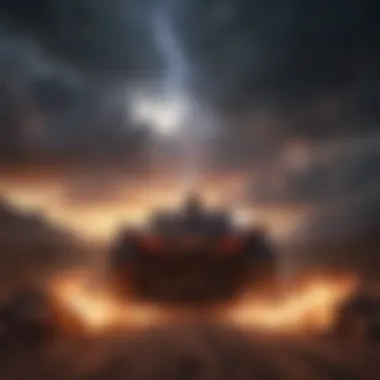
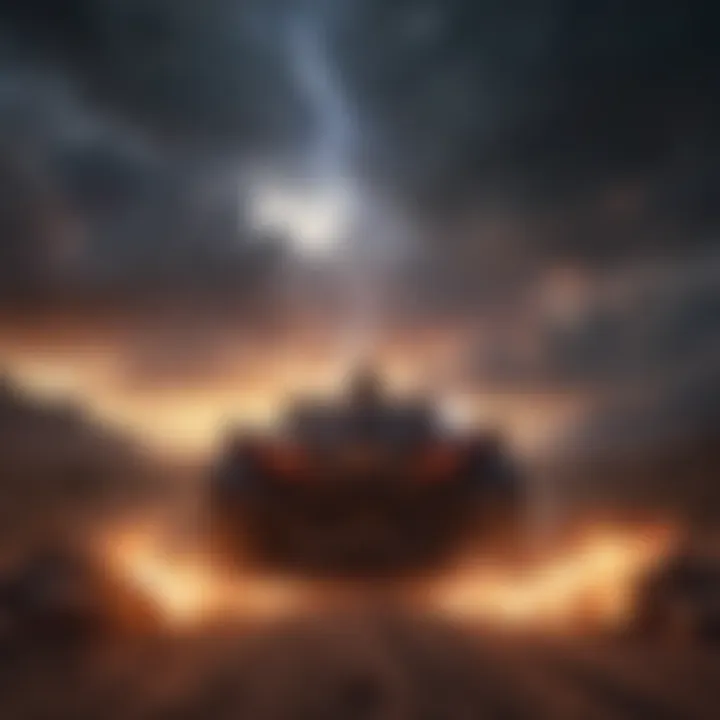
Intro
In the sprawling saga of Westeros, where political intrigue dances hand in hand with cosmic forces, the conflicts between gods and men emerge as a captivating focal point. The Wars of Gods and Men intricately weave together the fates of powerful deities and the everyday struggles of humanity. What fuels these clashing powers? How do their interventions shape the destinies of kings and commoners alike? Understanding these conflicts allows us to peel back the layers of the rich narrative, revealing the deep-rooted themes of power, faith, and morality that resonate throughout the ages.
Exploring these elements uncovers insightful perspectives on the characters that populate this world. From the fiercely loyal followers of deities to the desperate mortals caught in an unending battle for survival, each participant encompasses a part of the greater battle that defines Westeros. This article will take you on a journey through key characters, significant episodes, and the historical lore that contributes to this epic narrative.
Character Dissections
Delving into the personal stories of significant figures sheds light on their motivations and actions throughout the series. Key characters are not merely players in this grand game; they represent the ideological struggles that mirror the fabled conflicts between gods and mortals.
- Daenerys Targaryen: Often depicted as a liberator, Daenerys’s evolution illustrates the thin line between righteousness and tyranny. Her determination to reclaim her ancestral throne propels her to act, sometimes leading to devastating consequences.
- Jon Snow: A bastion of honor amid chaos, Jon stands as a counterpoint to the divine elements at play. His lineage and choices explore the theme of identity and agency against prevalent fates.
- Cersei Lannister: Cunning and often ruthless, Cersei embodies the morally ambiguous terrain where personal ambition battles against divine notions of order and justice. Her struggles reveal how far one can go for power and what lines one may cross.
- The Three-Eyed Raven: A significant embodiment of mystical foresight, this character bridges the realm of the gods with human experience, challenging perceptions of destiny and free will.
These characters evolve in response to external pressures and internal dilemmas, often forcing them to navigate a landscape filled with divine influence and gravely human consequences. Their arcs illustrate a complex web of choices that resonates beautifully with the larger conflicts at play.
Episode Breakdowns
To fully grasp the significance of thematic elements, one must consider specific episodes that encapsulate these struggles. Each pivotal moment carries layers of symbolism, inviting deeper reflection.
- "Hardhome" (Season 5, Episode 8): This episode showcases the chilling clash between the Night King and the living, symbolizing the ultimate end of mortal concerns in the face of true cosmic evils. The fragility of human life becomes all too apparent as alliances dissolve.
- "The Battle of the Bastards" (Season 6, Episode 9): A visceral representation of the struggle for power, this episode highlights the consequences of personal vendettas against the backdrop of larger cosmic forces. Jon’s fight against Ramsay Bolton intensifies the moral gravity of warfare.
Visiting these moments showcases how personal narratives are intertwined with broader themes, deepening our understanding of the central conflicts.
Lore Explorations
Westeros is steeped in myth and history, where ancient tales lay the groundwork for present-day conflicts. Understanding its lore illuminates hidden connections and motivations influencing current events.
- The Faith of the Seven: This religious structure reflects the struggle for influence in a world where divine favor dictates the fates of rulers and commoners. An examination reveals how fervent beliefs can both unite and divide societies.
- The Old Gods versus the New: The ongoing tensions between various belief systems showcase conflicting ideologies and their consequences, precipitating significant events in the North.
Unearthing these details reveals how the past continuously resonates into the present, shaping ideologies and alliances.
Fan Theories
The passion of the fandom fuels an ongoing discourse surrounding the series, giving rise to various theories that add another layer of intrigue.
- R+L=J: This prevalent theory suggests the true parentage of Jon Snow, asserting that his heritage places him at the heart of the struggle between legacy and identity. Knowing his bloodline drastically impacts his role within the narrative framework.
- The Role of Azor Ahai: Speculation about this legendary figure underlines many pivotal conversations about destiny and heroism, echoing through characters’ journeys.
These fan theories, both popular and obscure, highlight the dynamic nature of the storytelling, encouraging continual exploration of themes and character motivations.
The wars of gods and men are not simply about the clash of blades; they embody the persistent struggles of identity, power, and morality that resonate deeply with the human experience.
The Concept of Divinity in Westeros
The intricate tapestry of Westeros is woven with the threads of faith, mythology, and powerful deities. The diversions within this concept aren't just footnotes in the narrative; they’re pivotal to understanding the motivations behind the wars fought by men and gods alike. Exploring the diverse beliefs and their implications sheds light on the moral compass guiding the characters as they navigate the turbulent landscape of power and survival. The complexities within the religious sphere highlight both the fervor and folly of humans in their quest for meaning, influence, and dominion.
Understanding the Pantheon
The Seven
The Seven are central to the faith practiced by many in the Seven Kingdoms. Often depicted as a unity of distinct entities—each embodying different aspects of life—this pantheon can be seen as a reflection of humanity’s duality. The worship of the Seven illustrates how people seek protection and guidance in their daily struggles. The key characteristic of this belief is its organized structure, which creates a sense of community among followers. This aspect is beneficial for the narrative as it highlights how devoutness can shape social norms and political alliances.
An unique feature of the Seven is the Worship of the Mother, the Father, and the Warrior, among others. It presents an avenue through which individuals interpret personal and communal tribulations. However, the downside is the rigidity that can foster fanaticism, as seen in the Faith Militant, which often leads to violent outbursts against those who adhere to different beliefs.
The Old Gods
The Old Gods represent a more primal and rustic aspect of spirituality, rooted deeply in nature. Worshipped primarily by the Northmen, these ancient deities are linked to the mystical weirwoods, which offer an organic connection to the past. The key characteristic of the Old Gods is their inherent unpredictability; unlike the Seven, they are not bound by structured dogmas, making them appealing to those who crave a deeper connection to their ancestry.
The unique feature here is the mysteriousness that surrounds their worship, often conducted in silence within sacred groves. This can be both a strength and a weakness. On one hand, it allows for personal reflection and individual interpretation of faith; on the other, it lacks the communal unity that structured religions often provide, which can lead to alienation among followers.
The Lord of Light
In stark contrast to the Old Gods stands the Lord of Light, a deity known for his emphasis on the eternal struggle between light and dark. This faith, often showcased through vivid fire symbolism, encourages followers to seek truth and fight against the encroaching shadow. The key characteristic of this deity is the promise of rebirth and redemption, offering followers hope amid despair. It can be a beneficial choice for this narrative, reflecting the ongoing battles characters face against seemingly insurmountable odds.
A unique feature of this belief is the concept of prophecy, where individuals are seen as instruments in a divine plan. While this can inspire noble acts, it also creates a paradox: the pressure to fulfill prophecies can lead to tragic outcomes, underscoring the moral complexities embedded within the quest for power.
Other Deities
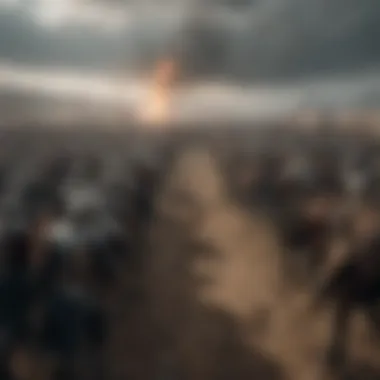

Beyond the principal religions, Westeros hosts a variety of other deities—from the Drowned God worshipped by the Ironborn to the Many-Faced God embraced by the Faceless Men. Each brings a key characteristic that enriches the spiritual landscape. The diverse beliefs reflect the pluralistic nature of human existence in this land, emphasizing that faith can be a source of strength or a weapon of manipulation.
The unique feature here is the ability of these lesser-known gods to embody specific cultural values and ethos of their followers. While this underpins various conflicts throughout the saga, it also invites readers to juxtapose different perspectives on divinity and morality. The danger lies in how these gods can be co-opted for personal ambition, resulting in moral quandaries that resonate within the broader narrative.
Intersections of Faith and Politics
Religious Authority in the Realm
The intersection between religion and politics serves as a critical battleground in Westeros. Here, religious authority often shapes political ideologies and actions. The key characteristic that emerges is the sheer influence a religious identity can have on the power dynamics within the realm. Successive rulers have realized that controlling religious narratives can provide legitimacy to their rule, reaffirmed by the fervor of devout followers. This relationship is particularly significant as it establishes foundations for political loyalty and resistance.
A notable unique feature of this relationship is the use of sacred texts and rituals as tools for political manipulation. The repercussions can be dire, leading to outright warfare or persecution based on pious zealotry. Thus, while wielding religious authority can bolster one’s power, it also poses risks of creating deep-seated divisions among the populace.
The Role of the Faith Militant
The Faith Militant exemplifies how religion can become militarized, leading followers into battle in the name of their beliefs. This organization represents a transformation of spiritual convictions into martial actions. One of the key characteristics of the Faith Militant is its commitment to upholding the tenets of the Faith of the Seven through physical might, often resulting in brutal enforcement of doctrine.
A notable unique feature is how its existence raises ethical questions about the extent to which faith should intersect with violence. The line between defending one's beliefs and enforcing them through coercion becomes blurred, complicating the notion of righteousness, lending moral ambiguity to the group's actions.
Manipulation of Religion for Power
Manipulating religion serves as a focal point in the power struggles throughout Westeros. Leaders, such as Cersei Lannister, seek to use the fervor of religious devotion as a weapon against rivals. The key characteristic of this manipulation is its effectiveness in rallying support or inciting fear among the populace, which can be instrumental in achieving one’s aims.
The unique feature of this manipulation, however, often leads to unforeseen consequences. Characters who deploy religion as a means to gain power may find themselves ensnared by their own schemes as fervor can just as easily turn into rebellion. This paradox complicates the narrative, adding layers to the interplay between faith and governance.
Human Conflicts: The Wars Between Men
The conflicts between men in Westeros play a crucial role in shaping the narrative landscape of the series. These wars are not just mere physical confrontations but are deeply intertwined with the identities, ambitions, and emotional landscapes of the characters involved. Unlike the celestially driven battles among the gods, the wars waged by men are characterized by human emotions—greed, vengeance, loyalty, and betrayal—that resonate on a more personal level with the audience. This section focuses on how these human conflicts reflect broader themes of power, morality, and the consequences of choices.
The Rise of House Stark
Origins and Legacy
House Stark stands as a beacon of honor and stability in a realm often beset with treachery. Their roots go deep into the history of Westeros, tracing back to when the North was room for its first King, Brandon the Builder, who is said to have helped erect the Wall. The Starks are known for their unwavering loyalty and sense of duty, which resonate throughout the series. This legacy makes them not only a sympathetic choice for readers but also a significant counterpoint to the chaos that envelops the Seven Kingdoms. The core characteristic of House Stark is their motto, "The man who passes the sentence should swing the sword," which underscores their commitment to justice. However, their adherence to this code can also lead to tragic consequences.
The unique feature of House Stark's legacy lies in their tragic downfall, which illustrates the harrowing cost of loyalty in a world fraught with deception. Their downfall serves as a cautionary tale about the peril of being honorable in a dishonorable world.
The War of the Five Kings
The War of the Five Kings stands out as a critical turning point in the narrative fabric of Westeros, illuminating the chaotic struggle for the Iron Throne. This conflict features five claimants to the throne, each representing various factions and interests, showcasing the fractious nature of power dynamics in the realm. Its key characteristic is its complexity, drawing in multiple houses and characters, each driven by their own motivations. This conflict is not just a simple power grab but a reflection of deeper issues of identity and vengeance that resonate throughout the series. It is a pivotal topic because it reveals how the pursuit of power can lead to devastation and despair.
The unique feature of this war is its unyielding unpredictability, demonstrating that even the most meticulously planned strategies can spiral into chaos. This aspect provides a rich terrain for exploring the themes of fate, chance, and human folly.
Consequences of Loyalty
The theme of loyalty often contrasts with the brutal realities of war in Westeros. The loyalty shown by characters like Eddard Stark often leads to personal tragedy and misjudgment, raising important questions about the implications of loyalty in a landscape rife with betrayal. The key characteristic of this subsection is the exploration of the dichotomy between loyalty and survival. It’s significant for this article as it challenges the reader to reconsider the nature of loyalty in a world where betrayal is rampant.
A unique feature of this discussion is the lens through which loyalty is observed—not merely as a virtue, but as a potential flaw. Characters like Theon Greyjoy provide examples of how misplaced loyalty can lead to dire consequences, illustrating that unwavering devotion isn’t always aligned with wisdom.
The Complex Nature of House Lannister
The Quest for Power
The pursuit of power has been a hallmark of House Lannister, often driving the plot forward and creating ripple effects throughout Westeros. The Lannisters embody wealth and ambition, continually seeking to enhance their position in the realm. Their primary characteristic is their cunning nature, often dismissed as mere greed but deeply entwined with their survival strategy. This aspect is relevant because it contrasts starkly with the honor upheld by House Stark, highlighting the conflict between different values in the realm.
A unique feature of the Lannisters' quest is their ability to manipulate situations to their advantage, leading to a power dynamic that continually shifts. This adaptability often results in temporary victories—a testament to the volatile nature of power in Westeros.
Family Dynamics and Rivalries
The internal rivalries within House Lannister expose the complex family dynamics that underpin human conflicts in the series. The relationships between Tywin, Jaime, Cersei, and Tyrion are rife with tension, loyalty, and betrayal. The key characteristic is the nuanced portrayal of family ties as both a strength and a vulnerability. This focus is vital to the article, as it reveals how personal relationships can influence broader political maneuvers in Westeros.
The unique feature of these dynamics is the often contradictory nature of familial loyalty—where love can quickly become resentment and ambition can eclipse compassion. This aspect adds depth to the series, enriching the characters and providing a reflection on human nature.
Strategic Alliances
In the relentless pursuit of power, the Lannisters' strategic alliances become crucial. These alliances serve as lifelines in a treacherous political landscape. The primary characteristic is their adaptability—forming alliances not out of genuine trust but for expediency. This is an important focus for the article, as it illustrates how alliances can alter the fate of houses and individuals alike.
The unique feature of these alliances is their fragile nature. They can dissolve quickly, often leading to unexpected consequences and backstabbing. The volatility of these relationships embodies the transient alliances in the pursuit of power, reflecting the ever-shifting sands of loyalty in Westeros.


"When the snows fall and the white winds blow, the lone wolf dies but the pack survives." - This philosophy resonates deeply in the context of loyalty and betrayal within these houses, showcasing that alone, one may falter, but together, power can be wielded—or lost—swiftly.
Key Battles: Collisions of Divine and Mortal Forces
The conflicts that thread through Westeros are not merely the result of human ambition or folly. The key battles serve as pivotal moments where the overwhelming forces of divinity and humanity meet. These confrontations underline the themes of fate, honor, and survival. In this realm, every clash holds significance, reflecting the deeper struggles between godly interventions and human choices. They reveal the motivations of characters and illustrate how power dynamics operate, both among men and within the divine.
The Battle of the Blackwater
Military Strategy
Military strategy in the Battle of the Blackwater was sophisticated, marked by careful planning and resourcefulness. Tyrion Lannister, tasked with defending King's Landing, used a combination of deceptive tactics and novel weaponry. His decision to leverage wildfire, a highly volatile substance, showcases strategic ingenuity that played a decisive role in the conflict. The unique aspect here is how this strategy was not only about brute force; it involved psychological warfare to throw the enemy off balance.
The important characteristic of this strategy was the boldness of relying on wildfire rather than traditional siege techniques. This unexpected turn would catch Stannis Baratheon and his forces by surprise, emphasizing how cleverness can triumph over sheer numbers. The advantage here was the element of surprise, leading to catastrophic losses for the opposing side. However, the disadvantage lay in the risks taken—the volatile substance could easily harm allies as well as foes.
Divine Interventions
Divine interventions during the Battle of the Blackwater play a crucial role, illustrating the unpredictable nature of faith in warfare. Here, the influence of the Lord of Light can be seen, albeit subtly. Melisandre, with her prophetic visions and rituals, sparks significant fears and hopes among the characters, shaping their fates in ways they least expect. This highlights how faith can alter perceptions of reality.
A key aspect of these interventions is the moral ambiguity that accompanies them. Melisandre’s contribution, while strategically sound in her eyes, raises questions about the ethics behind her actions. While her magic aids Stannis’s forces, it also underscores the potential for manipulation when gods intervene. Such outcomes lead to understanding that divine influence can often mislead rather than guide, an idea that can resonate with themes of free will versus predestination.
Aftermath and Implications
The aftermath of the Battle of the Blackwater evokes a web of implications that ripple through the political landscape of Westeros. The victory for the Lannisters solidified their grip on power, but at what cost? The destruction wrought by wildfire left not just physical scars but also deep psychological ones among the citizens of King's Landing. The key characteristic of the aftermath is its dual nature—while it brought temporary stability, it stoked resentment and fear.
One unique feature of this aftermath is the transformation in the political dynamics following the battle. Tyrion’s tactical brilliance earns him a degree of respect, but the shadow of fear over his means lingers. Within the broader narrative, this illustrates how victories can be hollow when built upon violence and dread, leading to further conflicts down the line. Citizens, questioning loyalties and alliances, become more volatile, hinting at future confrontations. The advantage lies in the newfound strength of the Lannisters, yet the disadvantage surfaces as rising tensions among the populace foreshadow unrest.
The Battle of the Bastards
Stakes of Identity and Honor
The stakes involved in the Battle of the Bastards were deeply entwined with themes of identity and honor. For Jon Snow and his supporters, reclaiming Winterfell was not just about territory; it symbolized the return of honor to House Stark. The narrative revolves around the reclaiming of legitimacy and the quest for identity, especially as Jon positions himself as the rightful heir to everything he holds dear.
The potent characteristic of these stakes rests in how they encapsulate the themes of legacy and belonging. By fighting for Winterfell, the characters are battling not only for a castle but for the very soul of their house, reinforcing the deep-seated values that resonate with audiences. The advantage here is the strong emotional connection it fosters with viewers, who understand that honor can be a powerful motivator. However, the disadvantage lies in the potential for downfall when honor outpaces tactical considerations.
Role of Fate in Human Conflict
The role of fate in the Battle of the Bastards serves to weave a complex narrative, where destiny and choice intersect. The long-foretold clashes between the Stark and Bolton forces highlight the ongoing struggle against fate that characterizes much of the series. Jon Snow's determination to fight, despite overwhelming odds, symbolizes the human spirit's resilience against predestined outcomes, reflecting the broader themes of agency and consequence.
A defining characteristic of this role is the notion that while characters may feel trapped by their fates, they often possess the power to challenge these narratives. Each decision made in the heat of battle emphasizes this dynamic, drawing audiences into the characters' internal conflicts. The advantage of this exploration is that it deepens understanding of character motivations, yet the disadvantage may be a feeling of inevitability that breeds despair among others.
Legacy of Victory and Defeat
The legacy of the Battle of the Bastards carries a weighty historical context that echoes throughout the ongoing narrative. Jon Snow’s victory not only restores the Stark identity but also sets the stage for a complicated future. This battle illustrates how victories can reshape alliances and reopen old wounds, thereby influencing relationships across the realm.
A key characteristic of this legacy is the dual narrative it creates: one of hope and restoration for the Starks, and another of vindication and vengeance for those who have suffered at the hands of the Boltons. This variegated legacy resonates with viewers, highlighting the complexity of outcomes in warfare. The advantage of such a legacy is its ability to produce rich storytelling opportunities, while the disadvantage remains in the cyclical nature of violence that persists in Westeros after each battle.
The collisions between divine and mortal forces shaped destinies and charted the course of history within Westeros, proving that conflicts are rarely one-dimensional.
In closing, the battles discussed herein illuminate the profound interplay between human ambition and divine intervention. They reveal larger questions surrounding fate, honor, and identity, inviting fans to ponder the complexities of conflict in Westeros.
Mythology and Morality in Conflicts
In the swirling chaos of Westeros, mythology and morality emerge as vital threads weaving the tapestry of conflicts. They serve not just as a backdrop but as active participants that shape characters' motivations and decisions, often leading to dramatic consequences. The struggles are not solely one-dimensional; they reflect the deeper philosophical quandaries faced by humanity.
Westeros is littered with tales of gods, prophecies, and moral conundrums that force characters into corners they never anticipated. This section dissects the heartbeat of the narrative, exploring how divine intervention and ethical dilemmas influence the constant fight for power, survival, and integrity amidst the ruins of ambition and betrayal.
The Role of Prophecy
Prophecy is a powerful tool within Westeros, often used to foreshadow events that might transpire.
Foreshadowing Events
The act of foreshadowing is integral to understanding the looming conflicts within the realm. Prophecies often hint at catastrophic events and monumental choices. Characters, like Daenerys Targaryen, are frequently burdened by prophecies, leading them to question the nature of their fate. The key characteristic of this tool is its ability to generate suspense and expectation among the audience. This makes it beneficial for the narrative; the anticipation keeps readers engaged and questioning the path that characters will take. However, the downside is that reliance on prophecy can lead to predictability. Over-dependence on such hints risks diminishing the element of surprise that is so pivotal in a world riddled with unexpected twists.
Prophets and Oracles
Connecting to the theme of prophecy, prophets and oracles occupy a unique place in the elusive landscape of Westeros. These figures guide characters towards decisions that can change the course of their lives. For instance, the character of Melisandre is known for her prophetic visions that often blur the lines between truth and illusion. The advantage of incorporating these figures into the narrative lies in their ability to evoke wonder and suspicion. The complexity they add creates layers to character motivations, making decisions profoundly impactful. However, this ambiguity might confuse some readers, leading them to ponder whether characters are acting on free will or are simply pawns of fate.
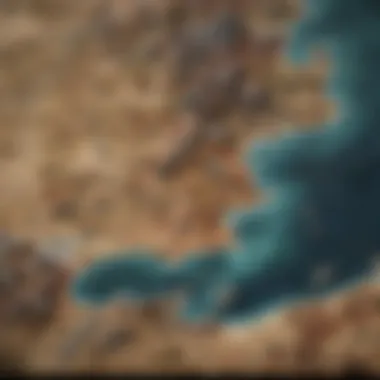
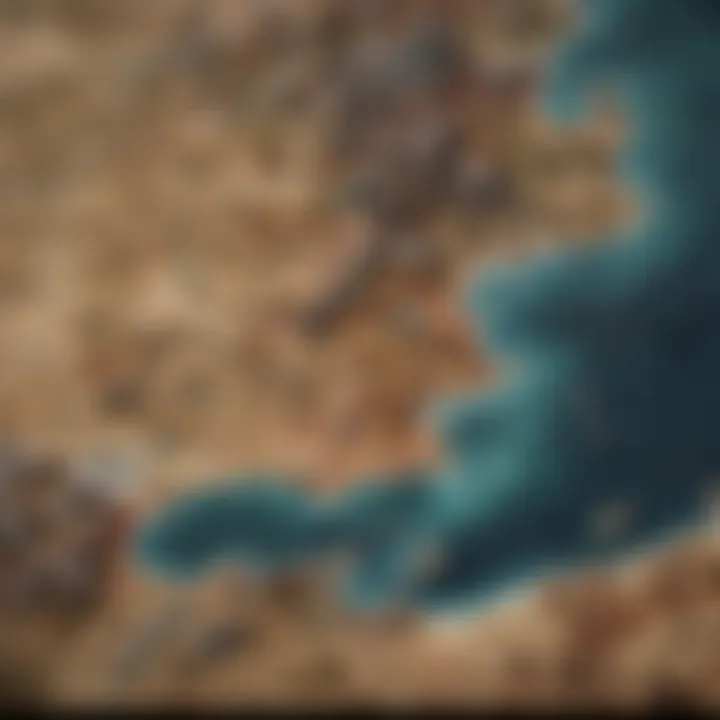
Free Will vs. Predestination
The debate over free will versus predestination is a quintessential theme in the conflicts of Westeros. It challenges whether characters are the architects of their destinies or if their fates are already inscribed in the annals of time. The key characteristic of this theme hangs on the balance between human agency and cosmic design. It serves as a beneficial avenue for reader interpretation, as it invites a multitude of discussions, encouraging audiences to reflect on their perceptions of control and fate. Still, a drawback is that the constant oscillation between these two concepts can lead to frustration. Readers might find themselves torn between rooting for a character’s choices and grappling with the weight of destiny dictating their journey.
Ethical Dilemmas within the Narrative
As the story unfolds, ethical dilemmas present themselves at pivotal moments, pushing characters to make anguishing decisions that reflect their moral compass. These dilemmas are a cornerstone of the narrative, examining the grey areas that define humanity.
When Honor Conflicts with Survival
In the grim world of Westeros, the clash between honor and survival is a recurring theme that resonates deeply. Our beloved characters frequently find themselves in tight spots where the honorable path conflicts directly with their instinct for self-preservation. The key characteristic here is the internal struggle that characters endure, grappling with their ideals while facing life-or-death situations. This makes it a compelling choice for the narrative, providing readers with heart-wrenching moments that evoke empathy. However, the moral compass in these scenarios can become muddled. Some readers might argue that such dilemmas diminish the impact of the characters’ previous honorable actions, leading to bitterness regarding their choices.
The Cost of Betrayal
Betrayal is at the heart of many conflicts in Westeros, probing the boundaries of loyalty and trust. Characters like Petyr Baelish personify the steep price of betrayal, where once allies become bitter enemies in ruthless play for power. The significance of exploring betrayal lies in its ability to unmask the true nature of characters — that even noble intentions can lead to devastating outcomes. This thematic element invites readers to ponder the nature of loyalty. Yet, its exploration can become repetitive, with too many instances of betrayal potentially leading to a sense of desensitization among the audience.
Moral Ambiguity of Characters
Moral ambiguity is woven through the fabric of Westerosi society. Characters like Jaime Lannister and Cersei demonstrate that motivations are often layered, with noble and vile acts intertwining. This complexity reflects real human experiences where choices are rarely black and white. Highlighting this ambiguity enriches the narrative, as it challenges readers to reconsider their judgments and sympathies. Nevertheless, the depth can also present challenges, as some readers may prefer more clearly defined heroes and villains, creating friction in the reader’s experience.
"In Westeros, to question morality is to question the very essence of humanity — a theme threaded throughout the blood-soaked saga of kings and gods."
In summary, the examination of mythology and morality in the conflicts of Westeros reveals profound thematic layers that resonate with audiences. By diving into the realms of prophecy, ethical dilemmas, and moral ambiguity, the narrative not only entertains but also prompts critical reflections on the very fabric of human nature.
The Legacy of The Wars
The conflicts that unfold in Westeros are not mere tales of bloodshed and betrayal, but rather reflections of deeper human truths and struggles. They echo themes that transcend the fictional borders of the realm, affecting how we perceive conflict in our own world. From epic battles to nuanced political maneuvers, the saga leaves behind a legacy enriched with cultural significance and moral quandaries, elements that are pivotal for understanding the broader narrative of the series.
The legacy we examine here is not just about the outcomes of battles or the fates of houses like Stark or Lannister. It encompasses the cultural impact, the philosophical lessons, and the resonance of these stories within modern society. In delving into this legacy, various aspects warrant close attention, such as the lasting influence on media and literature, the insights offered by fan interpretations, and the symbolic weight of conflict in today’s world.
Cultural Impact of the Series
Influence on Television and Literature
The impact of 'Game of Thrones' on television and literature is undeniable. Its intricate plots and multifaceted characters have reshaped how narratives are constructed in contemporary media. The series stands as an example of how television can achieve the same depth previously reserved for literary works. This shift is characterized by complex storytelling combined with high production values, setting a precedent for future shows.
Interestingly, the show's popularity has sparked a wave of adaptations and original content inspired by its themes and characters. This demonstrates a unique feature of its influence: it doesn’t just affect other fantasy genres, but also shapes the portrayal of human emotion and political intrigue across various media. The advantage here is a richer tapestry of storytelling that fosters a deeper connection with audiences through its exploration of moral ambiguity.
Fan Interpretations and Theories
Fans of the series are often seen engaging with the material like scholars, dissecting character motivations and theorizing about potential outcomes. This engagement elevates the significance of fan interpretations and theories. Each theory contributes to the overall conversation about the series' meaning, enriching the lore with individual perspectives that interweave with the canonical narrative.
What stands out in this regard is the democratization of narrative interpretation. Fans often curate their insights online, leading to discussions that can influence how we perceive the story as a whole. However, the downside may be the fragmentation of understanding, as varied interpretations can clash, leaving some fans overwhelmed by conflicting viewpoints.
Symbolism of Conflict in Modern Society
Conflict in Westeros serves as more than mere entertainment; it acts as a mirror to real-world issues. The symbolism embedded in the series — from the nature of power struggles to the consequences of betrayal — resonates on multiple levels, allowing audiences to draw connections between the fictional and the actual.
This connection is vital, as it highlights the lessons learned in Westeros, applicable to our daily lives. A key characteristic of this symbolism is how it invites viewers to reflect on their own moral dilemmas in a complex world. Recognizing the consequences of actions, both noble and foul, becomes a shared theme. The challenge, however, lies in avoiding oversimplification of these lessons, ensuring that an appreciation for the depth of the series does not devolve into one-dimensional interpretations.
Enduring Themes and Lessons
Power Dynamics and Human Nature
At the heart of 'Game of Thrones' is the exploration of power dynamics and human nature. The constant struggle for power reflects the often ruthless reality of our own societies. This theme resonates profoundly as characters grapple with their ambitions, revealing the darker aspects of humanity — greed, envy, and loyalty tested.
Particularly telling is how these power struggles influence relationships and alliances, illustrating that loyalty is often dictated more by circumstance than by kinship or honor. The advantage of this theme in the context of the article is its relatability, prompting readers to examine their own power dynamics in personal or professional realms.
Faith and Doubt
Faith, a recurrent theme in the series, generates questions about belief systems and their influence on individuals and societies. Characters like Melisandre epitomize the strife between faith and doubt, showcasing how fervent belief can lead to both empowerment and tragic consequences.
This theme is particularly engaging as it encapsulates a universal struggle — the quest for meaning in a chaotic world. However, it also serves as a cautionary tale about the reliance on absolute beliefs, urging a more nuanced understanding of faith and its implications in realms far beyond Westeros.
Peace through Understanding
Ultimately, a striving for peace through understanding serves as a poignant conclusion to the saga's reflections. Through cycles of violence, characters often learn that resolution can be found not in bloodshed but in dialogue and compromise. This theme underscores the necessity of empathy, encouraging audiences to ponder the importance of understanding diverse perspectives in their own lives.
Navigating this theme can provide valuable insights into fostering genuine connections, reflecting a hopeful narrative amidst the chaos that defines much of the series. However, achieving peace can be fraught with challenges, showcasing the complex and often bittersweet nature of conflict resolution.
“In the land of ice and fire, the only constant is change, yet the quest for understanding remains a guiding light.”
In summary, the legacy of the wars in Westeros extends beyond the confines of fiction, providing a framework through which we can examine our world. Through each thematic exploration, readers are called to engage with these narratives critically, fostering a richer understanding of themselves and the societal forces at play.



